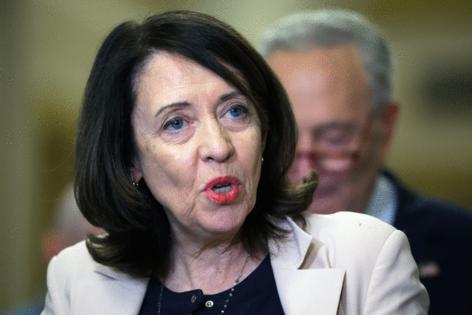Washington Sen. Maria Cantwell leads bipartisan push to give Congress control over tariffs
Published in Political News
Amid a widening trade war launched by President Donald Trump, Washington Sen. Maria Cantwell is leading a bipartisan push to give Congress more authority in setting tariffs.
Cantwell on Thursday introduced legislation that would limit the ability of the president to impose tariffs unilaterally. Cantwell, a Democrat, co-sponsored the bill with Sen. Chuck Grassley, R-Iowa.
Under the new legislation, all new tariffs would expire in 60 days unless they are approved by Congress. When enacting a new tariff, the president would have to notify Congress within 48 hours and include the reasoning behind imposing the tariff. The explanation would have to have an analysis of the tariff’s potential impact on businesses and consumers.
The bill is the first bipartisan legislation in the Senate that attempts to limit Trump’s tariff powers, Cantwell’s office said.
The legislation is modeled after the War Powers Resolution, legislation from 1973 that forbids armed forces from remaining in military action overseas for more than 60 days without congressional approval.
“Trade wars can be as devastating, which is why the Founding Fathers gave Congress the clear Constitutional authority over war and trade,” Cantwell said in a prepared statement. “This bill reasserts Congress’s role over trade policy to ensure rules-based trade policies are transparent, consistent, and benefit the American public.”
Republicans have been loath to push back on the broad executive authority asserted by Trump, the leader of their party, in his second term.
Grassley, the most senior member of the Senate, who’s been in office for 44 years, said he was co-sponsoring the bill to “reassert Congress’ constitutional role and ensure Congress has a voice in trade policy.”
“For too long, Congress has delegated its clear authority to regulate interstate and foreign commerce to the executive branch,” Grassley said in a prepared statement.
The legislation comes just as Trump launched his broadest yet batch of tariffs, announcing 10% tariffs on nearly all American trading partners Wednesday, and tariffs as high as 40% on some countries.
Trump has argued that the U.S. has been ripped off for decades by unfair trade policies that have led corporations to expand manufacturing overseas at the expense of American jobs. Economists warn that the tariffs will launch a trade war that will lead to higher prices for Americans and could mean the end of the global economic system, based on cooperation, that the U.S. has led since the end of World War II.
“With President Trump, you know, it’s a roller coaster of ideas and approaches,” Cantwell said in an interview Wednesday. “I don’t see logic here, or a strategy. And having a rules-based approach is so important in trade in general. And, you know, it’s time Congress looks at making sure that we are doing something to counter the president.”
Cantwell said she had heard from two or three Republican senators who said they’d been taking constituents to the White House to try to sway the administration on the risks of its approach to tariffs.
“They’ve been trying to get their constituents to the president, to, you know, educate him on what the impacts of this will be, and why they’re so devastating,” she said. “So far, they haven’t had success.”
Trump has previously announced tariffs on Canada and Mexico — the U.S.’ two biggest trading partners, as well as on all imported cars and many car parts. Washington is one of the nation’s most trade-dependent states, with 40% of the state’s jobs tied to international trade or related industries.
Imports and exports accounted for more than $127 billion worth of economic activity in Washington in 2023.
“We’re going to see the price of cars go up, and the fact that the American public can’t afford grocery costs, health care costs, or housing costs — we certainly don’t need to add in auto costs,” Cantwell said on the Senate floor last week. “I’m pretty sure it’s a good deal for Elon Musk and Tesla. Don’t know that it’s such a good deal for everybody else.”
©2025 The Seattle Times. Visit seattletimes.com. Distributed by Tribune Content Agency, LLC.




























































Comments